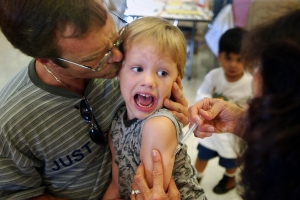Despite numerous studies from medical science that have consistently proven the safety and necessity of vaccines, some Americans still refuse to vaccinate themselves or their children. However, the reasons behind their refusal to do so can be complicated.
According to the Associated Press, more than 100 people fell ill in a measles outbreak that has been traced back to Disneyland. Despite criticism about their intelligence, parenting skills and even mental health, the skeptics, many of whom are educated and in the middle class, provided an insight as to why they decided to forego the shots for their children.
"Contrary to the common sentiment, we are not anti-science," said Michelle Moore, a Portland businesswoman who is the mother of 2-year-old twin girls. "I'm not opposed to medicine, and I think vaccines have a place. We think it's a medical choice, and it should be researched carefully."
Although the Associated Press reported that Moore was still open to vaccinating her children as they grew older. However, she entertained the notion of home-schooling her twins if the state of Oregon took away the "right" to be exempt from vaccines.
"I worry about living in a society that's progressively more intolerant toward any dissent," Moore said. "All scientific advances have come from questioning the status quo."
Missouri registered nurse Heather Dillard, who is also a mother, argued to the Associated Press that parents should have the right to decide what medical procedures their children receive, including vaccinations.
"I have the right to decide what to put into my child's body," Dillard said. "Nobody has the right to put toxic chemicals into my son's bloodstream. That's taking my rights away, and it's very scary to me."
Steph Solis of Asbury Park Press reported that New Jersey loosened its vaccine exemption requirements in 2009 after people no longer had to cite proof of religious beliefs to be granted one. She noted that outside of medical reasons, it was the only way for parents in New Jersey to opt of vaccinations for their children.
"Right now in New Jersey, it's actually easier to get an exemption than it is to get a shot," Drew Harris, director of the Population Health Program at Thomas Jefferson University, Philadelphia, said.
Harris, alongside the state's Department of Health, provided New Jersey's 2013-14 inoculation data to Solis, who then matched up vaccination rates with zip code data. She found that there was "no relationship between income or education when it came to opting out of vaccinations."
"Rich communities as well as middle-class had schools with high exemption rates," Solis wrote.
However, Harris cautioned that it was too early to determine any pattern or links among the unvaccinated populations.
"It could turn out that there's not a pattern and what it could be is a trend, a fad or a social phenomenon that works through the community that vaccines are bad," Harris said.
Dr. Glenn Fennelly, an infectious disease expert and chairman of the pediatrics department at Rutgers University, told Solis that the best defense against disease outbreaks, including measles, could involve removing religious exemptions altogether.
"It's hard to say whether that (religious exemptions) is the common most single reason for vaccination refusal, but ultimately we have to be absolute about it," Fennelly said. "We have to have no religious exemptions or conscientious exemptions for an infection like measles that can put other lives at risks."
However, Sue Collins, co-founder of New Jersey Coalition for Vaccination Choice, told Solis that she only wanted to remind people of what the vaccination law in New Jersey dictated. Collins even argued that taking away the religious exemptions could amount to "discrimination."
"You can't limit someone's religious beliefs to a physical building," Collins said. "It's just, to me it's kind of just an area, when exempt people saying you have to belong to this (religious) group...then you're getting into religious discrimination."
The Associated Press reported that across the United States, parents who seek an exemption from vaccine requirements are still in a tiny minority. The Centers for Disease Control and Prevention noted that median total exemption rate for kindergartners during the 2013-14 school year was just 1.8 percent.

















